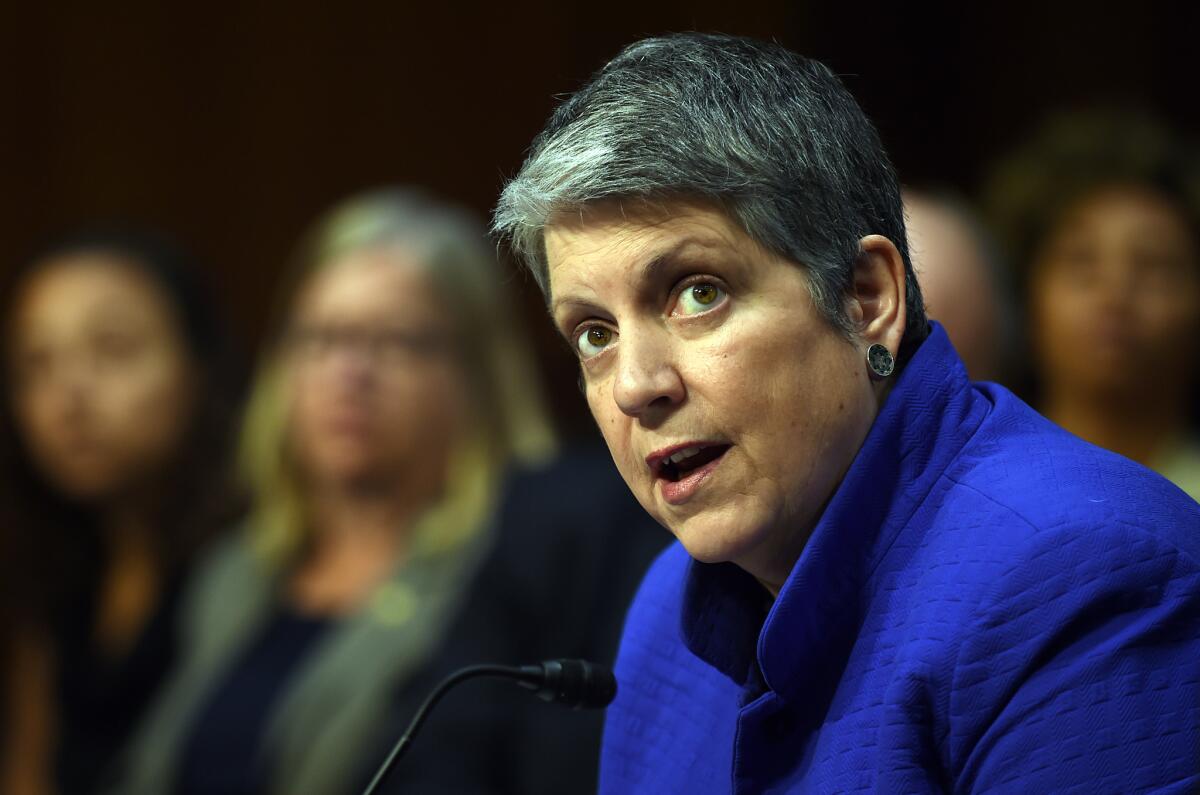UC President Napolitano to keep close tabs on Berkeley’s actions against sexual misconduct

University of California President Janet Napolitano announced new steps Saturday to keep close tabs on UC Berkeley’s efforts to combat sexual misconduct.
- Share via
University of California President Janet Napolitano announced new steps Saturday to closely monitor UC Berkeley’s handling of sexual misconduct cases following outcry that campus administrators gave light sanctions to powerful faculty members found to have sexually harassed students and staff.
Napolitano said in a statement that UC Berkeley Chancellor Nicholas Dirks has agreed to provide written reports to her office on campus progress in combating sexual misconduct and would meet monthly with her beginning April 1.
Napolitano has also assigned Jody Shipper, the systemwide director for sexual misconduct issues, to work full time with Berkeley to make sure that complaints are investigated quickly and equitably. Shipper will work with the campus at least through the end of the semester, Napolitano said.
“I am happy that Chancellor Dirks agrees that these issues demand concentrated, effective measures,” Napolitano said in a statement. “We both believe UC Berkeley needs to bring the same focus and competence to its handling of sexual assault and harassment investigations as it does its education and research missions.”
Napolitano’s intervention comes after weeks of protests on campus that Dirks and Provost Claude Steele had mishandled cases involving law school Dean Sujit Choudhry, prominent astronomer Geoff Marcy and vice chancellor of research Graham Fleming. The three faculty members were found to have violated UC’s sexual harassment guidelines and resigned under pressure.
Campus officials recently fired assistant men’s basketball coach Yann Hufnagel after finding that he had sexually harassed a reporter by sending her explicit and threatening text messages. Hufnagel’s former boss, Head Coach Cuonzo Martin, is now under review for his handling of the situation.
Although campus sexual misconduct is a national problem, Berkeley has been a hotbed of protest over the issue. In 2014, 31 women filed a federal complaint alleging a decades-long pattern of mishandling cases by campus administrators.
In the recent law school case, faculty, students and staff have condemned Dirks and Steele for allowing Choudhry to stay in his job with a 10% pay cut, counseling and apology to his then-executive assistant, Tyann Sorrell. She is suing Choudry and the regents for failing to take adequate steps to protect her from what she alleged was near-daily unwanted kisses, hugs and touching over six months last year. Choudhry has admitted the behavior but said it did not occur as frequently as alleged.
Napolitano, who learned about the case through the news media, stepped in and ordered Dirks to keep Choudhry off campus through the end of the school year and refer him to the Academic Senate for disciplinary hearings. She also directed Dirks to remove Fleming from a job as a campus “global ambassador” he was given after resigning.
Aiming to stem the outcry, Dirks unveiled a new plan to combat sexual misconduct on Thursday, including quicker investigations, more money for counseling and other services for victims and expanded education and training. Officials will also establish a new review committee to make sure sanctions are imposed in a “firm and consistent manner regardless of the rank or position of either the complainant or respondent” Dirks said in his announcement.
Dirks said Saturday that he welcomed Napolitano’s assistance in helping Berkeley improve.
“The president and I share a sense of urgency around the need for concerted action,” Dirks said in a statement. “I am fully committed to driving significant and substantive change on the Berkeley campus.”
Dirks has named Carla Hesse, a history professor and executive dean of the College of Letters & Science, to lead the campus improvement efforts until a permanent coordinator is hired in the summer. Hesse, who has also headed the Committee on Women and Minorities for the American Historical Association, said she hoped to make a “quick and significant impact.”
Napolitano’s actions mark the latest steps to address sexual misconduct on UC campuses since she took the presidency of the 10-campus system in 2013.
Among other things, she established a systemwide task force on sexual misconduct in 2014, which issued comprehensive recommendations for more education, training, counseling services, data collection and campus websites to prevent and address the problem.
One highly praised improvement has been the hiring of “confidential advocates” at each campus to help victims of sexual misconduct find services and navigate the reporting system.
Napolitano’s first major work on the issue came in 1991, when she represented Anita Hill, who alleged in Senate hearings that Clarence Thomas, a federal judge being considered for the U.S. Supreme Court, had sexually harassed her while she was working at the U.S. Department of Education and the U.S. Equal Employment Opportunity Commission. The two women reunited last year at a Berkeley program on sexual misconduct.
For more education news, follow me @TeresaWatanabe.
ALSO
Multiple sex harassment cases against UC faculty prompt new review process
At UC Berkeley, promises of a crackdown on sexual misconduct are met with skepticism by students
Corinthian Colleges must pay nearly $1.2 billion for false advertising and lending practices
UPDATE:
3:00 p.m.: This article was updated with the name of the interim lead coordinator of campus improvement efforts.
This article was first published on March 26 at 2:46 p.m.
More to Read
Sign up for Essential California
The most important California stories and recommendations in your inbox every morning.
You may occasionally receive promotional content from the Los Angeles Times.











